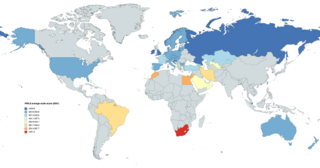Psychometrics is a field of study within psychology concerned with the theory and technique of measurement. Psychometrics generally covers specialized fields within psychology and education devoted to testing, measurement, assessment, and related activities. Psychometrics is concerned with the objective measurement of latent constructs that cannot be directly observed. Examples of latent constructs include intelligence, introversion, mental disorders, and educational achievement. The levels of individuals on nonobservable latent variables are inferred through mathematical modeling based on what is observed from individuals' responses to items on tests and scales.
Psychological testing refers to the administration of psychological tests. Psychological tests are administered or scored by trained evaluators. A person's responses are evaluated according to carefully prescribed guidelines. Scores are thought to reflect individual or group differences in the construct the test purports to measure. The science behind psychological testing is psychometrics.
Test of English as a Foreign Language is a standardized test to measure the English language ability of non-native speakers wishing to enroll in English-speaking universities. The test is accepted by more than 11,000 universities and other institutions in over 190 countries and territories. TOEFL is one of several major English-language tests worldwide, including IELTS, Duolingo English Test, Cambridge Assessment English, and Trinity College London exams.

Educational Testing Service (ETS), founded in 1947, is the world's largest private nonprofit educational testing and assessment organization. It is headquartered in Lawrence Township, New Jersey, but has a Princeton address.

The International English Language Testing System is an international standardized test of English language proficiency for non-native English language speakers. It is jointly managed by the British Council, IDP: IELTS Australia and Cambridge Assessment English, and was established in 1989. IELTS is one of the major English-language tests in the world. There are two modules and an additional test.
The Common European Framework of Reference for Languages: Learning, Teaching, Assessment, abbreviated in English as CEFR, CEF, or CEFRL, is a guideline used to describe achievements of learners of foreign languages across Europe and, increasingly, in other countries. The CEFR is also intended to make it easier for educational institutions and employers to evaluate the language qualifications of candidates for education admission or employment. Its main aim is to provide a method of learning, teaching, and assessing that applies to all languages in Europe.
Cambridge Assessment English or Cambridge English develops and produces Cambridge English Qualifications and the International English Language Testing System (IELTS). The organisation contributed to the development of the Common European Framework of Reference for Languages (CEFR), the standard used around the world to benchmark language skills, and its qualifications and tests are aligned with CEFR levels.

The IEA's Progress in International Reading Literacy Study (PIRLS) is an international study of reading (comprehension) achievement in 9-10 year olds. It has been conducted every five years since 2001 by the International Association for the Evaluation of Educational Achievement (IEA). It is designed to measure children's reading literacy achievement, to provide a baseline for future studies of trends in achievement, and to gather information about children's home and school experiences in learning to read.
The Versant suite of tests are computerized tests of spoken language available from Pearson PLC. Versant tests were the first fully automated tests of spoken language to use advanced speech processing technology to assess the spoken language skills of non-native speakers. The Versant language suite includes tests of English, Spanish, Dutch, French, and Arabic. Versant technology has also been applied to the assessment of Aviation English, children's oral reading assessment, and adult literacy assessment.
Language proficiency is the ability of an individual to use language with a level of accuracy which transfers meaning in production and comprehension.
Holistic grading or holistic scoring, in standards-based education, is an approach to scoring essays using a simple grading structure that bases a grade on a paper's overall quality. This type of grading, which is also described as nonreductionist grading, contrasts with analytic grading, which takes more factors into account when assigning a grade. Holistic grading can also be used to assess classroom-based work. Rather than counting errors, a paper is judged holistically and often compared to an anchor paper to evaluate if it meets a writing standard. It differs from other methods of scoring written discourse in two basic ways. It treats the composition as a whole, not assigning separate values to different parts of the writing. And it uses two or more raters, with the final score derived from their independent scores. Holistic scoring has gone by other names: "non-analytic," "overall quality," "general merit," "general impression," "rapid impression." Although the value and validation of the system are a matter of debate, holistic scoring of writing is still in wide application.
Samuel J. Messick III was an American psychologist who worked for the Educational Testing Service (ETS), known for his contributions to validity theory.
Harcourt Assessment was a company that published and distributed educational and psychological assessment tools and therapy resources and provided educational assessment and data management services for national, state, district and local assessments. On January 30, 2008, Harcourt Assessment was merged into Pearson's Assessment & Information group after being acquired from Reed Elsevier for $950 million.
Pearson PLC offers various international standardized test of English language proficiency for non-native English language speakers. The tests include the Pearson Test of English Academic, the PTE General, and PTE Young Learners. These are scenario-based exams, accredited by the QCA and Ofqual, and are administered in association with Edexcel.
Language assessment or language testing is a field of study under the umbrella of applied linguistics. Its main focus is the assessment of first, second or other language in the school, college, or university context; assessment of language use in the workplace; and assessment of language in the immigration, citizenship, and asylum contexts. The assessment may include listening, speaking, reading, writing, an integration of two or more of these skills, or other constructs of language ability. Equal weight may be placed on knowledge and proficiency, or greater weight may be given to one aspect or the other.
The Lexile Framework for Reading is an educational tool that uses a measure called a Lexile to match readers with books, articles and other leveled reading resources. Readers and books are assigned a score on the Lexile scale, in which lower scores reflect easier readability for books and lower reading ability for readers. The Lexile framework uses quantitative methods, based on individual words and sentence lengths, rather than qualitative analysis of content to produce scores. Accordingly, the scores for texts do not reflect factors such as multiple levels of meaning or maturity of themes. Hence, the United States Common Core State Standards recommend the use of alternative, qualitative methods for selecting books for students at grade 6 and over. In the US, Lexile measures are reported from reading programs and assessments annually. Thus, about half of U.S. students in grades 3rd through 12th receive a Lexile measure each year. In addition to being used in schools in all 50 states, Lexile measures are also used outside of the United States.
Adaptive comparative judgement is a technique borrowed from psychophysics which is able to generate reliable results for educational assessment – as such it is an alternative to traditional exam script marking. In the approach, judges are presented with pairs of student work and are then asked to choose which is better, one or the other. By means of an iterative and adaptive algorithm, a scaled distribution of student work can then be obtained without reference to criteria.
The Michigan English Test (MET) is a multilevel, modular English language examination, which measures English language proficiency in personal, public, occupational and educational contexts. It is developed by CaMLA, a not-for-profit collaboration between the University of Michigan and the University of Cambridge and has been in use since 2008.
Mark Daniel Reckase is an educational psychologist and expert on quantitative methods and measurement who is known for his work on computerized adaptive testing, multidimensional item response theory, and standard setting in educational and psychological tests. Reckase is University Distinguished Professor Emeritus in the College of Education at Michigan State University.


